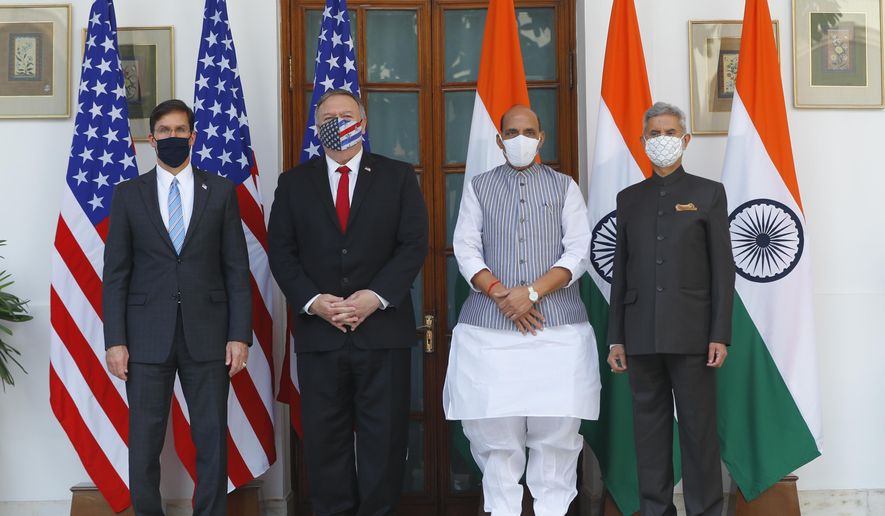NEW DELHI — Secretary of State Mike Pompeo and Defense Secretary Mark Esper met with their Indian counterparts for two days of talks here aimed at strengthening security ties in the face of growing aggressiveness by China.
The latest session of the so-called “2 plus 2” Ministerial Dialogue of foreign and defense ministers included the signing of a new agreement to increase military and intelligence cooperation.
Mr. Esper held talks with Indian Defense Minister Rajnath Singh and Mr. Pompeo met with Minister of External Affairs Subrahmanyam Jaishankar. The two nations also hope to increase co-production and co-development of defense equipment.
Mr. Esper said the talks made substantial progress in strengthening U.S.-India ties.
“Based on our shared values and common interests, we stand shoulder to shoulder in support of a free and open Indo-Pacific for all, particularly in light of increasing aggression and destabilizing activities by China,” Mr. Esper said during a press conference at the end of the talks.
Mr. Pompeo, the Trump administration’s driving force for a new policy of confronting China, called the talks an important step in aligning “our democracies” against encroachment by Chinese authoritarianism.
Discussion of the pandemic led to increased cooperation between the Department of Health and Human Services and Indian health authorities, Mr. Pompeo said.
“The challenge of defeating the pandemic that came from Wuhan also fed a robust discussion about the Chinese Communist Party,” Mr. Pompeo said. “Our leaders and our citizens see with increasing clarity that the CCP has no commitment to democracy, the rule of law, transparency or freedom of navigation, the foundation of a free and open and prosperous Indo-Pacific.”
But Indian leaders at the press conference made no mention of China in their remarks, in line with New Delhi’s lower key approach to dealing with Beijing.
Mr. Singh, the defense minister, said only that major challenges facing both nations were discussed in depth and that U.S.-Indian military-to-military cooperation “is progressing well,” he said.
The most important accord was the Basic Exchange and Cooperation Agreement (BECA) signed between the National Geospatial Intelligence Agency, the United States’ photographic spy agency, and the Indian Defense Ministry. The agreement will increase intelligence-sharing needed to monitor Chinese naval activities, including extensive submarine deployments, in the Indian Ocean.
The two sides also reached a maritime information-sharing technical agreement.
The latest session, the third of its kind, is part of a major diplomatic effort by the United States to develop closer alliances in Asia to confront China in response to stepped-up activities in both land and sea disputes in the region.
China’s state-owned Global Times, in its coverage of the summit Tuesday, said the agreements could boost India’s military abilities and weapons accuracy, but said Chinese analysts have concluded “there is absolutely no chance for India to reverse the reality of the military power gap between China and India, not to mention defeating China in possible military conflicts.”
Earlier Tuesday, Mr. Pompeo and Mr. Esper placed a wreath at India’s National War Memorial, a reminder of the recent deadly clash with the Chinese. Chinese military forces clashed in June with Indian troops on the high-altitude disputed border. The battle killed 20 Indian troops and killed an unknown number of Chinese troops.
U.S. and Indian officials said the new agreements are part of increased logistical support and maritime cooperation — mainly joint naval cooperation. Recently the Navy’s USS Nimitz aircraft carrier conducted a passing exercise with the Indian navy in the Indian Ocean. Last year, the two militaries conducted the first tri-service exercise with forces from the Navy, Marine Corps, Air Force and Army.
In a first, Australia recently agreed to join India’s Malabar naval exercises in November with warships from the United States, India and Japan — the so-called Quad of states working to push back against increasing Chinese geopolitical encroachment in Asia.
Retired Navy Capt. Jim Fanell said the BECA accord will enhance maritime operational intelligence sharing and send a strong signal to Beijing.
“This meeting is set against the backdrop of an expanding, and increasingly aggressive and violent, People’s Republic of China (PRC), especially as it relates to ensuring freedom of navigation and free access to markets across the high seas,” Mr. Fanell said in a recent op-ed.
Capt. Fanell said the U.S. and Indian militaries have done more than talk and have acted together. Earlier this month, a Navy P-8 maritime patrol aircraft landed at Port Blair, on India’s Andaman and Nicobar Islands.
India has been reluctant to join a formal defense and security alliance with the United States, over concerns about its traditional role as a leader of the so-called nonaligned nations grouping. However, the Indian government’s views have changed over its growing concerns about China’s aggressiveness.
• Bill Gertz can be reached at bgertz@washingtontimes.com.




Please read our comment policy before commenting.